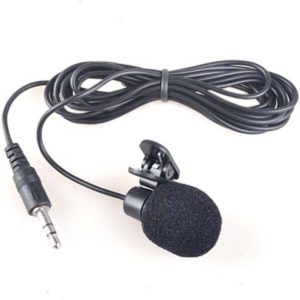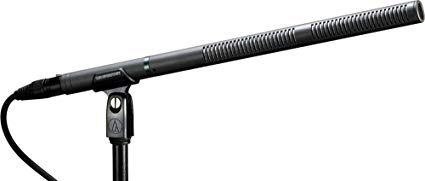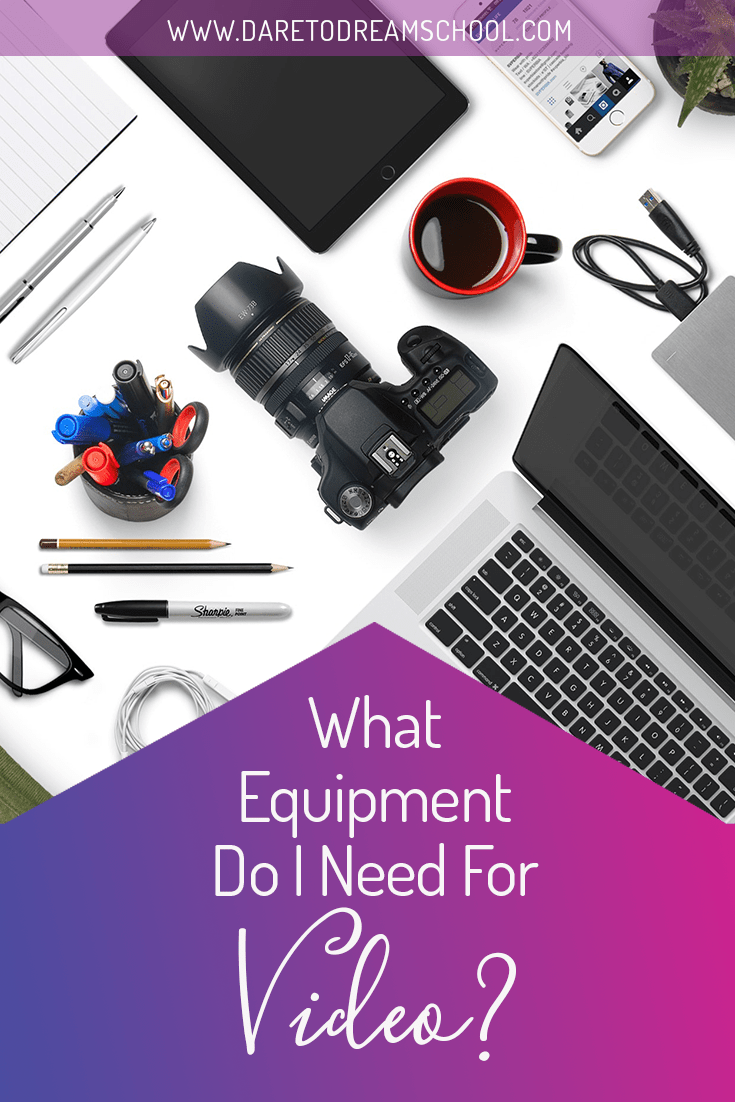What equipment do I need to start with if I want to get on video?
I heard video is so important for business but oh my gosh where do I start?
How much money do I need to invest?
How much is one of these things and why is this lens so big and why does this microphone have a big fuzzy thing on it?!
And why are these microphones so big?
Okay, well I'm gonna help you out today. I'm condensing 20 years of film-making experience and 25 years of theatre performing experience, to help you, Dare to Dreamers, and Entrepreneurs step into the spotlight.
I've been making a bunch of videos live this week and right now I will address one of the biggest questions I get which is “What equipment do I need to buy to start?”
What equipment do I need for video making? Reality Check
The answer is not gonna be what you expect. People think that equipment is this magic bullet. If you just spend X amount of money in this fancy equipment you're gonna have these amazing videos that everybody's gonna watch.
And that those people are gonna buy merchandise or services from you. You're gonna go viral. All this wonderful stuffs gonna happen as long as you spend X amount of money.
Well, that is not how it works actually.
Once upon a time… when there were no fancy cameras
So let me tell you a quick story about something I learned when I went to film school many years ago.
A lot of people find this hard to believe but I went to school back when there was no easy access to things like HD cameras. If you wanted to work your way up to a fancy camera you had to learn how to shoot on actual film, which was very expensive.
That was the stuff people made major motion pictures with. So when you went to film school at that time, you had to use really cheap video cameras until you could work your way up to that.
So at my school, it was very frustrating because they wouldn't let us access the fancy expensive cameras. You could liken them to red cameras today, those are the fancier cameras videographers can buy but are very expensive.
It's kind of like if we wanted to shoot on film or a red camera today, we had to work our way up to it. If you were in the 101 class they are not going to give you access to these really expensive cameras because you don't know how to use them and at the time oh! That's frustrating!
But you know what? I'm really glad you didn't because they told us we had to focus on the craft.
Things to learn before buying a fancy camera
Learning the craft of telling stories on video first. You didn't need the fancy camera to do that so they gave us these junky little Sony Handycams (no offense Sony, I actually loved Sony cameras and I have a Sony camera now).
But compared to these big fancy film cameras we were like why are you giving us these little home movie camcorders?
They were really hot at the time but they were for home movies. They made us use those because they weren't as expensive. As new film students, we could break them and it wouldn't be that big a deal.
On the brighter side, we learned all the things that you can apply, whether you have something cheap or you have something expensive for your filming device. And we learned everything. We learned the importance of acting, the importance of staging the person in the right place, we learned the audio, the importance of audio.
We learned that the movement of the camera what you do when you move the camera or how close the camera is to the subject and how that affects the viewer psychologically. How that changes the pacing of your story.
We learned how to edit that footage and how that changes how people react to it. We learned the basics of lighting.
You can still learn that with a cheap camera versus an expensive camera.
We learned everything we had to know so that by the time we worked our way up to the fancy cameras, we were solid and we knew what we were doing and were ready and well prepared.
What camera do you need to buy?
So how does this translate to you?
Why am I telling you this story?
Because I know you're not going to film school and you're not asking a film department to give you equipment, but you're thinking about what do you make an investment on and usually the first thing people ask is what camera do I need to buy?
I want you to learn the lesson I learned going to film school, which is you don't need anything fancy.
If you're just starting out, and if you own a smartphone, you have the camera that you need right here. As long as it is a newer smartphone and it's not a razor phone from 2005, you're gonna get good enough quality.
You're ready to go. You can shoot your Instagram stories. You can turn it sideways and shoot your YouTube videos. You have what you need and, therefore, you don't need a camera yet.
Learn the craft first
So this probably not the answer you wanted, but you should be relieved.
I think people might be disappointed because you thought I'm gonna give you the magic bullet camera recommendation.
Again, if you're just starting out you need to learn that craft first. You need to learn the difference between a close-up and a wide shot and how moving the camera can be great or it can be terrible for the story you're trying to tell, for the emotion you're trying to elicit in your viewer or your customer.
You can work on your scripts. That's really the most important part. You got to be focusing on your scripts, and your delivery. Those are all things you can work on and get good at, hammer away at and build a solid foundation of knowledge and skill without spending any money.
What is the first thing you should buy in your video equipment?
So having said that, I did want to give you a recommendation for the first thing that you should buy.
The first piece of equipment you should buy is actually not a camera. The first thing you should buy is a microphone.
I know that's hard to believe because we're saying video, video is supposed to be painting with light. It's just light hitting our eyes, it's a visual thing.
So why am I saying a microphone is the first thing you need to buy?
We don't realize it, we are very visual creatures but audio plays a huge part in a piece of art. It plays a huge part in our psychology.
People will actually forgive low-quality visuals, much more quickly than they will forgive bad audio.
Have you ever watched a video and somebody's in their kitchen and there's so much echo in the room that it's hard to even understand what they're saying?
And for me, I don't even want to watch anymore because I'm having to work too hard.
You never want to make your viewer work too hard because they have way too many options out there for videos to watch. You want to make it easy and the easiest way to do that is to give them an enjoyable audio experience, give them nice clean audio.
Recommendations
You can find mics that go on top of your camera. If you use a real camera you can find one for pretty cheap. It can cost you anywhere from $30 to $100 or something but I'm not going to recommend this right now because I had told you you should start with your phone.
Lapel Microphones
Because you should start with your phone you actually only have to make a very small investment. I think the first thing you should buy is a lapel mic. It's a mic that fits on your lapel that's why it's it's called a lapel mic.

It's also known as a Lavalier Microphone. You may have heard it called a Lav before because that's short for Lavalier.
I actually don't know what that means because I've learned that in film school 15 to 17 years ago.
Anyways, you can start out with a really cheap one.
Mine are very fancy. Around $600 a pop, but you don't need something like that, These are wireless, they're Sennheiser and they're really nice. I actually got good deals by buying them used from a Hollywood Audio guy.
He hooked me up with his used kit he was upgrading.
For all you beginners, you can get mic for real cheap. It's only 13 US Dollars and that's just to start.
Once again you can upgrade your microphone later, but for now, I think you just start small. When you're ready to improve the audio on your cell phone/smartphone videos, buy a lapel mic.
But if you already own an actual camera then you can get one of these.

Shotgun Microphones
It's called shotgun because it's pointy and it's pointing in one direction and so the audio is picking up things in that direction. It's also called a directional microphone.
Not what you would expect as it's not a magic bullet. It will, though, help remove some of the sounds from far away and improve the quality because the mic is closer to your mouth. It'll be a little bit better quality than the cellphone.
iPhone Users
Now if you own an iPhone, with the newer connection, you will have to buy a cheap adapter. They're not expensive and they work just fine. I've used them for major live streams. No problem.
I can make recommendations at certain price tiers so be sure to check out my next video/blog post on that.
Want to learn more about the craft?
You know you don't have to go to film school nowadays because you have access to all this amazing information online. So I'm giving you my 20 years of experience here. Trust me when I tell you you don't need to invest in thousands of dollars on video equipment especially when you're getting started.
Learn the craft itself, like the writing which is free by the way! Writing is one of the best things you could ever learn because it doesn't cost you anything as long as you have a place to write things down.
Learn Beyond the Basics
I hope that you take some of this information and go out and at least by that lapel mic and start shooting videos for your business.
Let me know how it goes. Let me know on social media or leave me a comment with #daretodreamer and let me know if that's working out for you.
So remember, you dared to dream. That's what business owners do, that's what artists do, that's what creators do.
There will be people all the time all around you saying “You need to be more practical, you need to grow up, you need to be realistic, play it safe.”
Don't listen to them, never give up on your dreams always be a Dare to Dreamer.
Pin For Later


Michelle Osorio is a singer, filmmaker and content creator turned entrepreneur sharing her secrets to growth on social media and livestream.
